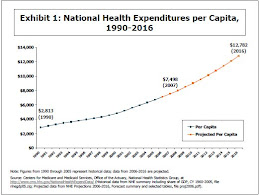Health care spending has historically been shielded from the effects of a declining economy for whatever reason, so in a recession as bad as the one we're experiencing now, it's really not a surprise that health care is taking up a huge chunk of the money pie.
One way to rein in the high spending might be to emphasize the use of generic medications instead of brand-name prescriptions. At least, that was the trend reported in 2007, which showed the smallest increase in health care spending since 1998, moving up only 0.2% from the previous year. I guess an emphasis on using electronic prescriptions would help keep costs down (the Brigham and Women's Hospital and HMS study projected that $845,000 could be saved each year for every 100,000 patients). This is called comparative effectiveness research, and a really interesting report was published by the Congressional Budget Office in late 2007 on exactly how such research (and implementation) could significantly reduce health care costs in the long term. A bill to establish a comparative effectiveness institution was proposed last April, and the initiative was listed as part of Obama's Plan for a Healthy America.
(Full CBO report here for those with lots of free time).
But, higher spending this time around seems to be coming from an increase in chronic conditions such as diabetes and high BP, as reported. Of course, prevention helps, but when you're already afflicted with chronic disease, there's really not much left to do but treat it...which means money spent on doctor vists, treatments, drugs, etc.
Regardless, I agree with Howard and Kate that more emphasis should be placed on preventative education to ensure that the high costs of medical treatment will be less pervasive in the future. In tough financial times, families have to make difficult choices, and usually the urgency to meet immediate needs--putting food on the table, keeping their homes--is given priority over something like a persistent cough that they'd wanted to get checked out.
In such situations, I believe it might be beneficial to increase the presence of nonprofit organizations who can provide basic medical and dental treatments, and give preventative health workshops (all free of cost). A workshop topic might be, for example, how to grow and maintain a vegetable garden, with the purpose of promoting healthy eating for families on a budget. However, due to the recession and the resulting difficulty in obtaining grants (or grants of any substance), nonprofit organizations are being forced to significantly reduce the scope and availability of their programs--which is where the feds could potentially step in and offer some help. Instead of bailing out the automobile industry with billions of dollars, they should have put a chunk of that money towards some of the aforementioned health care services.
Subscribe to:
Post Comments (Atom)

No comments:
Post a Comment